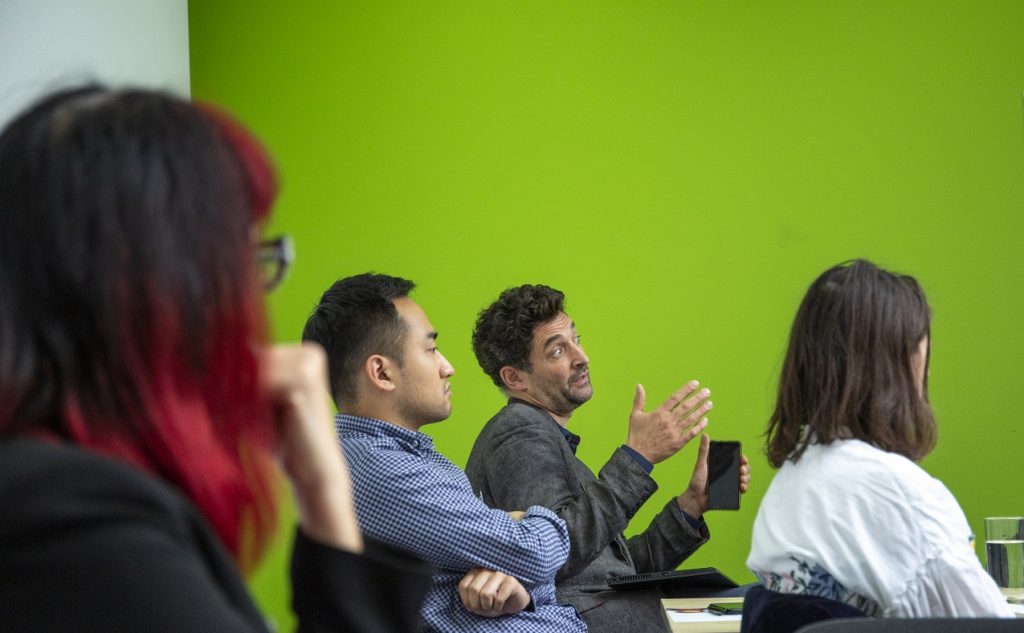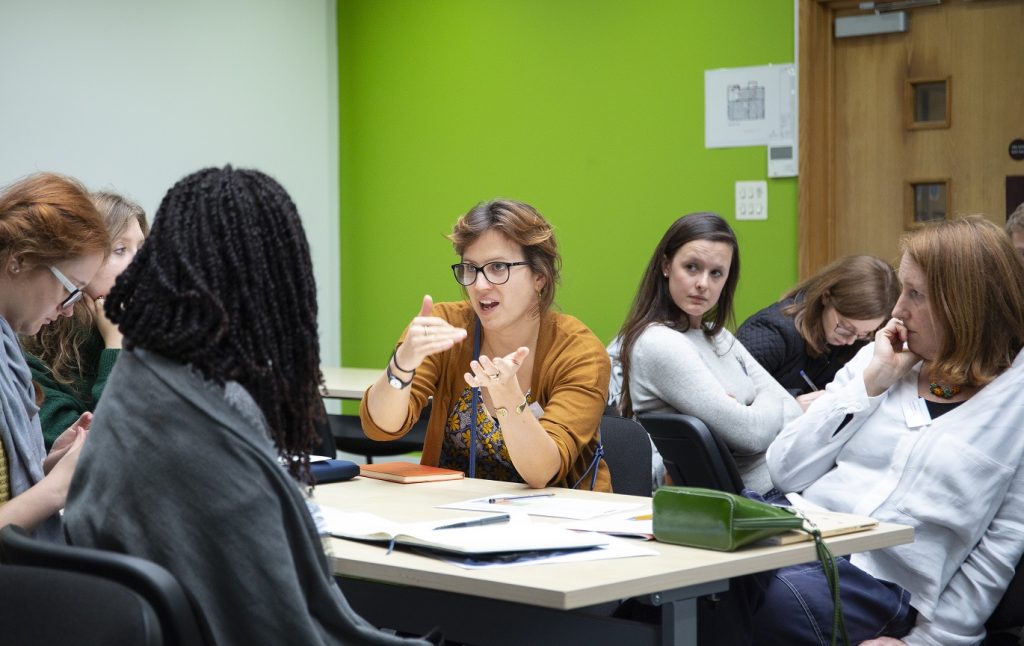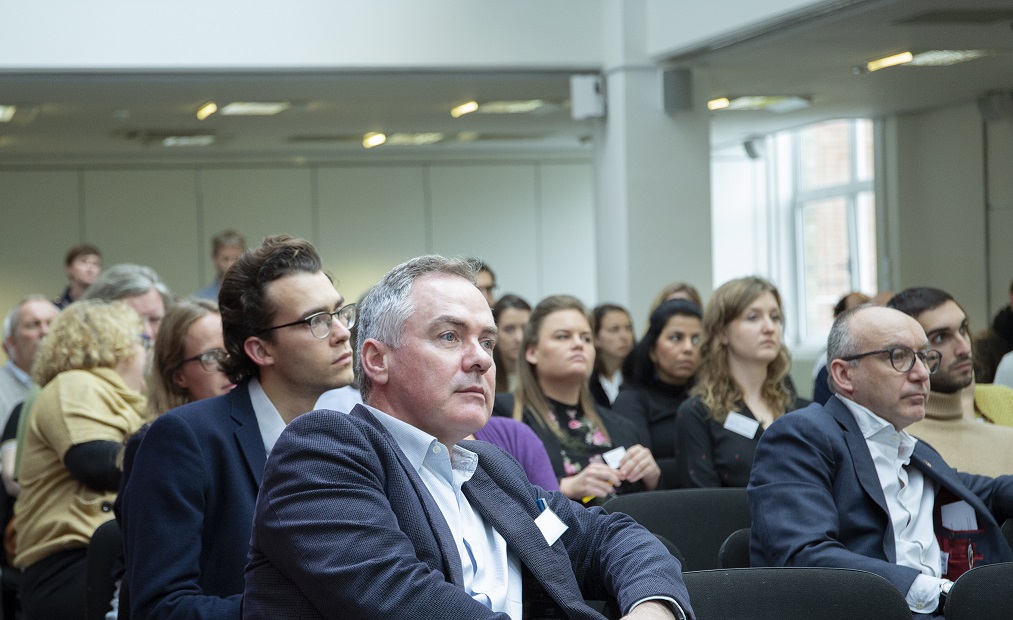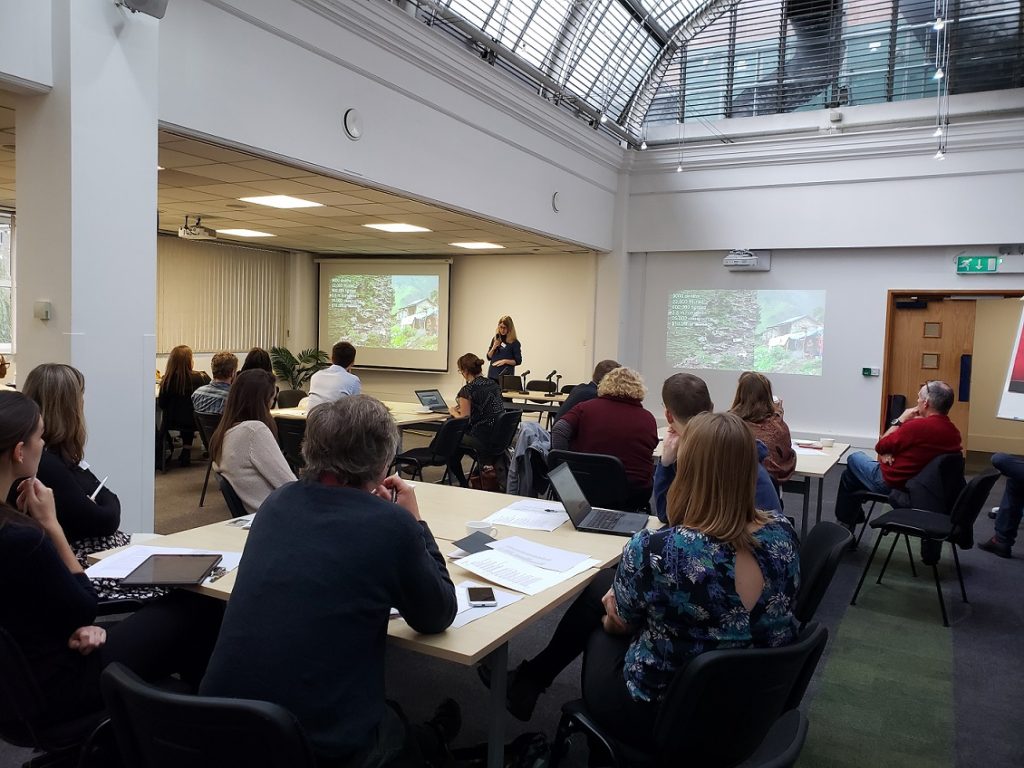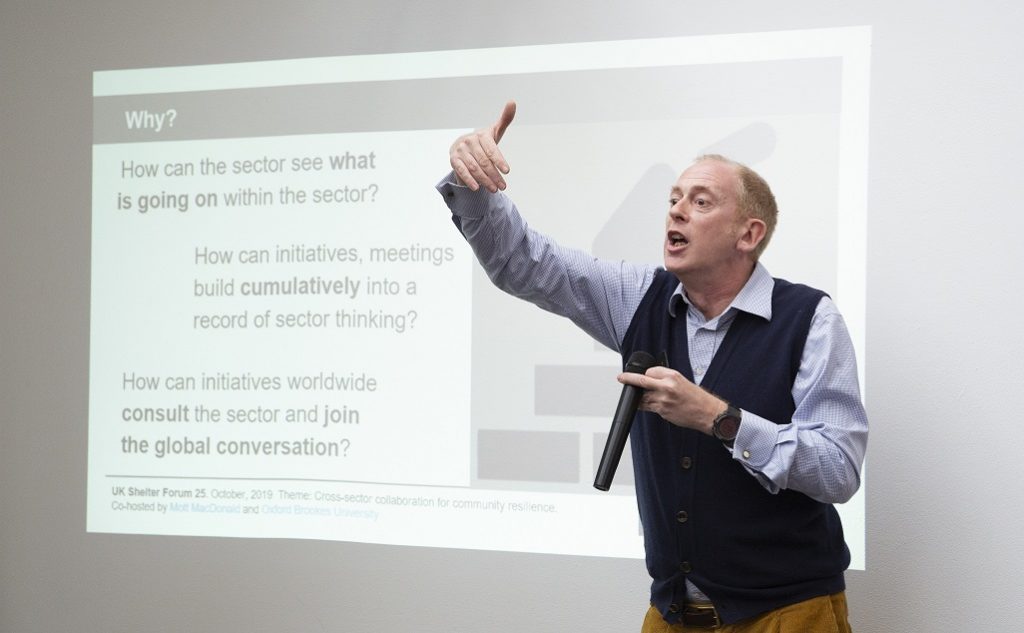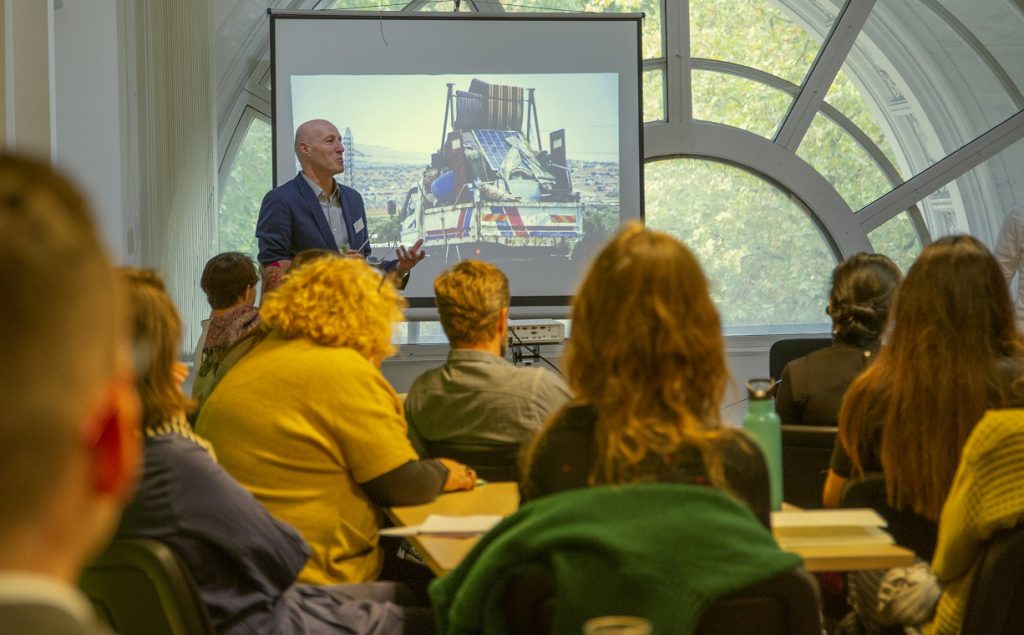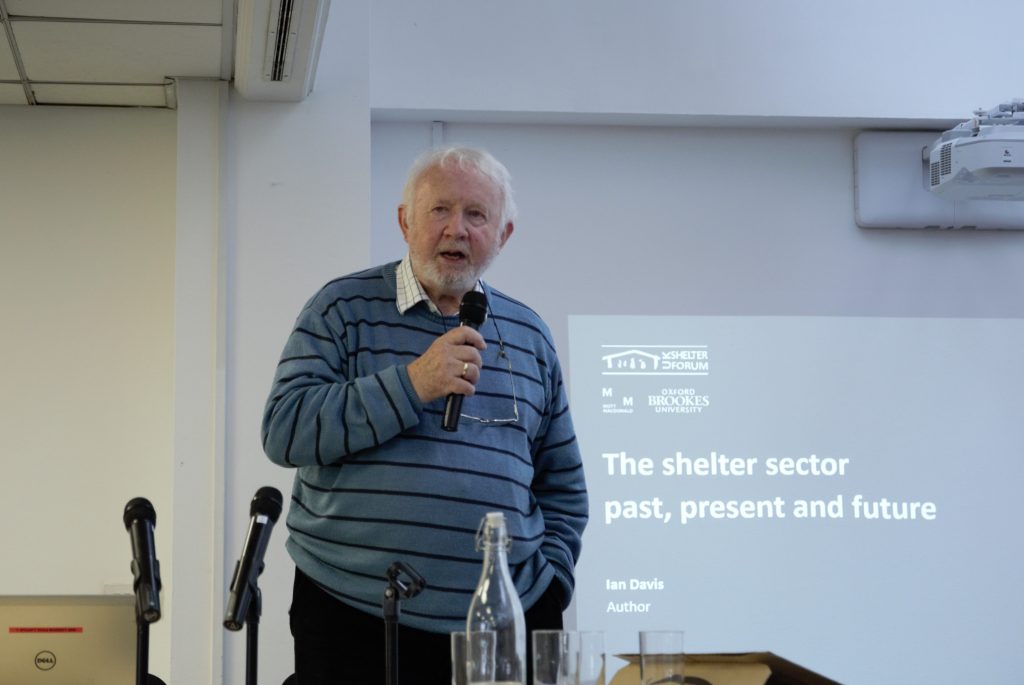The UK Shelter Forum 25 was held on 25th of October 2019 in London and was co-hosted by Mott MacDonald and Oxford Brookes University.
Delivering the needs of so many people displaced following natural disasters or conflict requires many disciplines to come together, so the theme of the forum was ‘Cross-sector collaboration for community resilience’.
A Technical Workshop on the same theme was also held on 24th October 2019.
The event highlighted the work carried out by private companies, professional institutions, academia and the humanitarian sector to create tools and solutions that improve immediate and longer term interventions in the field. Many case studies were shared, highlighting specific drivers and barriers to deploying solutions. We would like to thank all attendees and speakers for the great discussions and knowledge sharing we had throughout both days.
Ian Davis was also invited to the UKSF 25 for a presentation to recognise his contribution to shelter practice. Working in pre-disaster planning and risk reduction, post-disaster recovery from the immediate response phase to long-term reconstruction and adaptation to climate change.
A podcast was also produced under the event, called Crisis Shelter for Mass Displacement, which discusses the need for collaboration between humanitarians, local governments, academia and technical professionals to bring together those that manage disaster on the ground, and people who are developing better shelter.
Next UKSF 26 will be on Humanitarian Decision-Making – Save the Date!
Co-hosted by: Habitat for Humanity International and ALNAP
Date: Friday 15th May 2020
Location: Overseas Development Institute, London
More details coming in 2020. If you can’t wait that long then join ALNAP’s webinar on how humanitarians make operational decisions on 18 November or have a look at Habitat for Humanity International’s new research on how social norms shape low-income home construction.
Presentations from the Shelter Forum 25 are available here:
Presentations:
- Technical Approaches and partnerships for collective action – Brett Moore, Chief of the Shelter and Settlements Section, UNHCR
- Cross sector collaboration for community resilience –Lucy Palmer, Health Specialist, Mott MacDonald
- Latest progress and engagement: Humanitarian Library, Post-Conflict Engineering and a sector ‘dashboard’? – Tom Corsellis, Executive Director, Shelter Centre
- Healthy Housing for the Displaced – Shelter Assessment Matrix (SAM) – Steve Lo, Senior Lecturer in Sustainable Environment Engineering, University of Bath
- Role of Built Environment Professionals in disaster risk reduction – Peter Oborn, Senior Vice President, Commonwealth Association of Architects and Steering Group Member, Global Alliance of Urban Crises
- A reissue of the guide on Built Environment in Disaster Risk Reduction and Response – Rhys Jones, Founder, Humanitarian Landscape Collective
Announcements:
- World Habitat Awards and the report –Patrick Duce, World Habitat and Bill Flinn, CARE International
- Mott MacDonald Engineering Hope – Ana Ruiton, Mott MacDonald
Breakout groups presentations:
Open Source and Design for Manufacturing – friend or foe?
- A Platform approach to DfMA – Jaimie Johnston, Head of Global Systems, Bryden Wood
- Designing, manufacturing and innovating towards social sustainability in disaster management – Miguel Mora, Temporary housing and settlement researcher, Carnegie Mellon University
- Prototyping to enhance design manufacturing: fieldwork experience – Francis Moran, Research Associate, University of Bath
Collaboration between different stakeholders
- The Environment for collaboration in Area Based Approaches (ABAs) – Amelia Rule, Shelter Advisor – CARE International
- A Case for Working with the Green Sector – Rhys Jones, Founder, Humanitarian Landscape Collective
Additional materials
- Soaring High Self-recovery through the eyes of local actors – PEER EXCHANGE REPORT
- Through the eyes of local actors How self-recovery was supported after Typhoon Haiyan in the Philippines
Presentations from Technical Workshop are available here:
Presentations:
- Shelter – a nexus of nexuses – Jake Zarins, Associate Director – Disaster Risk Reduction Response, Habitat for Humanity International
- Shelter Projects – learning from past shelter and settlement responses – Joseph Ashmore, Humanitarian Advisor, IOM
- Shelter – Friendly Market Assessments – Jake Zarins, Associate Director – Disaster Risk Reduction Response, Habitat for Humanity International? and Rick Bauer, Independent Consultant, RBWA Ltd and Jake Zarins, Associate Director – Disaster Risk Reduction Response, Habitat for Humanity International?
Breakout groups presentations
Participatory Design??
- Participatory Action Planning in urban Tripoli, Lebanon – Amelia Rule, Senior Shelter Advisor, CARE International
- Early Childhood Development in refugees and displaced populations – Lucy Palmer, Health Specialist, Mott MacDonald and Sally Al Khayat Assistant Project Manager, Mott MacDonald
- Collaborating to integrate temporary housing needs and expectations into operational processes – Miguel Mora, Temporary housing and settlement researcher, Carnegie Mellon University
Collaboration across sectors
- Working Together – David Coley, Principle Investigator, Healthy Housing for the Displaced, University of Bath
- Circular Bamboo Housing Collaboration in Lombok – Xavier Echegaray, Structural Engineer, Ramboll?UK
- Collaboration Across Sectors: The BRE Trust Experience and Future Direction – George Foden, QSAND Support Officer, BRE Trust?
- Antimicrobial Resistance. What is its relevance to shelter? ?- Sarah Dobson, Health Specialist, Mott MacDonald?

